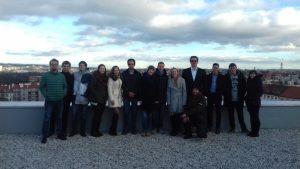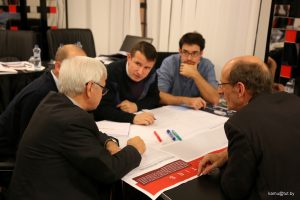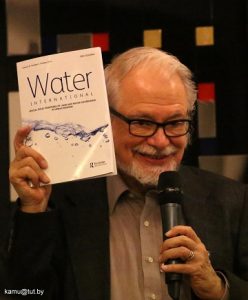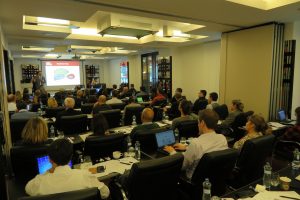
Winter school on energetics in Prague
In January – February 2018, the winter part of the bilateral Czech-Austrian course Energy & Society was organized in Prague in cooperation with Czech Technical University and University of Economics.
 The 13th year was inspired with the interactive form of teaching using experimental desing and discussions. Students visited small water power plant in Mirejovice and the coal power plant in Melnik.
The 13th year was inspired with the interactive form of teaching using experimental desing and discussions. Students visited small water power plant in Mirejovice and the coal power plant in Melnik.
The second part of the course will be held during summer in Vienna. In the meantime, bilateral Czech-Austrian teams develop common theses and looking forward to their second meeting.
Invitation for the international conference on post-industrial society in Usti nad Labem
Together with the Department of Regional Development and Public Administration and the Department of Geography, the IEEP organizes the international conference Social And Economic Development & Regional Policy: Adaptation Of Post-Industrial Society To Global Changes. The conference is under the supervission of the Regional Studies Association.
Conference dates: 27th – 28th June 2018. Abstract submission until: 31st March 2018. More info: here.
The relationship between competition and efficiency of waste-collection services in the Czech Republic
The role of the competition on the waste-collection market in the Czech Republic.
ABSTRACT: This paper examines the role of the competition on the waste-collection market. Based on the case study of the Czech Republic, we evaluate the influence of competition intensity on supply side of the market on efficiency of waste-collection services. The rate of competition was approximated by the number of submitted bids to public tenders and efficiency was measured by per capita expenditures for municipal waste-collection services. We developed two regression models – the first model verified a competitive effect on the public procurement market for the provision of waste-collection services; the second model identified factors that affected municipal expenditures for waste-collection services per capita. We concluded that the competition in the waste-collection market increases by organising open tenders for suppliers at regular intervals, by adapting the duration of contracts to economic life of fixed assets, by sustaining pressure on service providers through a change in suppliers or the distribution of contracts among jurisdictions.
Citation: Pavel J., Slavík J. (2017): Local Government Studies, doi: 10.1080/03003930.2017.1411812
Download: Paper available at the publisher here
The IEEP organizes first European meeting of its LAND4FLOOD Cost Action in Prague
On 9 – 10th November 2017, IEEP organized first large MC meeting of the COST Action LAND4FLOOD. There were participants from 28 European countries, having prof. James Nickum from IWRA as a special guest. One of the meeting goals was the development of a Policy Brief with the key topic of the project (why land matters for the flood risk management).





